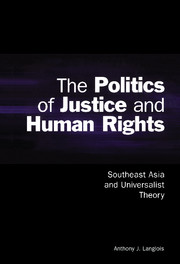Book contents
Introduction
Published online by Cambridge University Press: 05 July 2014
Summary
The discourse of human rights exhibits and exemplifies two tendencies which many commentators have seen as the defining features of international politics during the transition to a new millennium: globalisation and fragmentation. In its historical origin and philosophical milieu a Western idea, the concept of human rights has become an international language of emancipation. It is spoken in its heartland, Europe and North America, and it is spoken in those places which often are silently missing from standard accounts of globalisation, notable among them Africa. The concept of human rights is appealed to by the international elite of educationalists, philosophers, theologians, social scientists, intellectuals and academics. It is forever strong in the rhetoric of world leaders and national politicians seeking appeal to the moral sentiment of their constituencies. It is a credo for non-government organisation (NGO) workers involved in relief and development, education, religious instruction and political emancipation. And ‘human rights’ has even become a language of legitimation for those who by their actions most belie the meaning of the term: despots, dictators, authoritarian regimes and a range of economically powerful actors.
One of the effects of describing human rights as a universal language is to reinforce belief in a universal moral order. Such a moral order is often taken to be that which is articulated by the language of human rights. What we observe from today's global languages — English, for example — is that they are spoken in many different ways around the world.
- Type
- Chapter
- Information
- The Politics of Justice and Human RightsSoutheast Asia and Universalist Theory, pp. 1 - 11Publisher: Cambridge University PressPrint publication year: 2001

